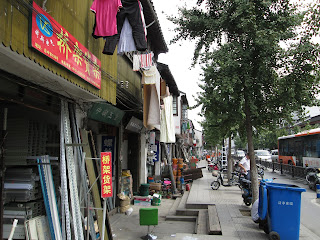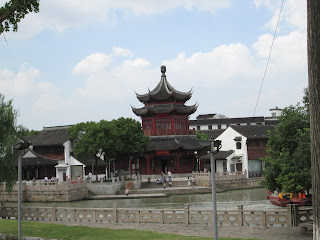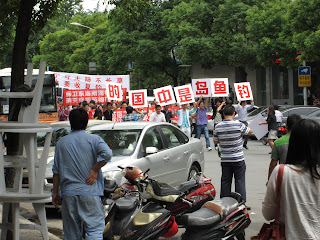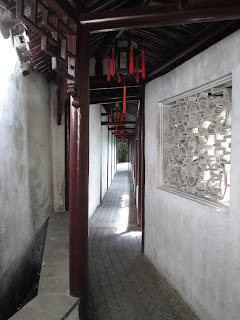I'm the young-looking mother here
Of the original members of our group, less than half decided
to try once again to go the garden, opting instead to go to a place of much
greater cultural importance: a bar.
Knowing the Chinese, there are most likely several real-life replicas of this in Mainland China
Miguel, the two Belgians Joke and Thomas, the Swiss Katerin,
and I, all went together on this grand adventure. Before we made it to the
gardens, however, we walked through an area where we were all convinced that
every industrial tool in the world is made. There were literally thousands of
stores lined up one after the other selling and making electric saws, sanders,
concrete mixers, and every sort of tool imaginable.
These pictures don't to justice to the sheer
volume of these stores
After a short walk through the seemingly endless row of
industrial tool stores, we found ourselves in front of an impressive gateway,
called Chang Gate (阊门), which
was obviously a rebuilt version of Suzhou 's
old city wall. We had finally arrived in slightly more touristy area.
The entrance to more culture!
Beyond the gate, we caught some glimpses of some of the
nicely upkept areas of classical Suzhou ,
complete with some impressive stone work and some nice looking Qing Dynasty-era
architecture.
While in a slightly more cultured area, we still had to be
reminded we were in modern China ,
where people just let their animals defecate on the streets:
The man didn't appreciate the fact I noticed his dastardly deed
We also ran into an interesting political demonstration,
with Chinese students and likeminded nationalists taking to the streets to
proclaim China 's right to
the Diaoyu Islands
Some of the folks noticed me taking pictures and either scowled
and smiled at me, so I gave them a thumbs up and cried out "钓鱼岛是中国的!" (The Diaoyu
Islands belong to China !) much to their bemusement and amusement.
After our brief foray into Chinese mass-movement politics, we finally made
our way to the Lingering Garden, a
400-year old garden that, up until the Communists "liberated" China
from the Guomindang in 1949, was a privately-owned garden that, over the centuries, was passed from
rich official to rich official.
*Insert pipe-dream comment about hoping to own a garden like this some day*
The garden was everything I hoped it would be, being both inspirational and
beautiful despite the throng of tourists.
The Lingering garden's design reminded me of the setting of the Chinese novel that got me
interested in Chinese literature in the first place, the Jin Ping Mei (金瓶梅),
which can be translated as The Plum in
the Golden Vase, or - as my outstanding graduate supervisor once said - The Book of Manners. The bulk of the
novel takes place in a large family compound that was said to have many fancy
gardens, pavilions, and artistic lakes, much like the Lingering Garden
Once you have finished reading my blog post, you will go to
Amazon.com right here and purchase a copy of the Jin Ping Mei to
read for yourself. If you don't, then there's
something terribly wrong with you.
The garden was also home to an ample collection of Chinglish:
Before we left the garden, we were able to witness a Kunju (昆剧)
performance, Suzhou 's
traditional opera.
After leaving the gardens, we once again ran into the same group of Diaoyu Island demonstrators, as they obviously felt it was too tiring to demonstrate
someplace else:
Until next time, please enjoy the appropriate music:












































No comments:
Post a Comment